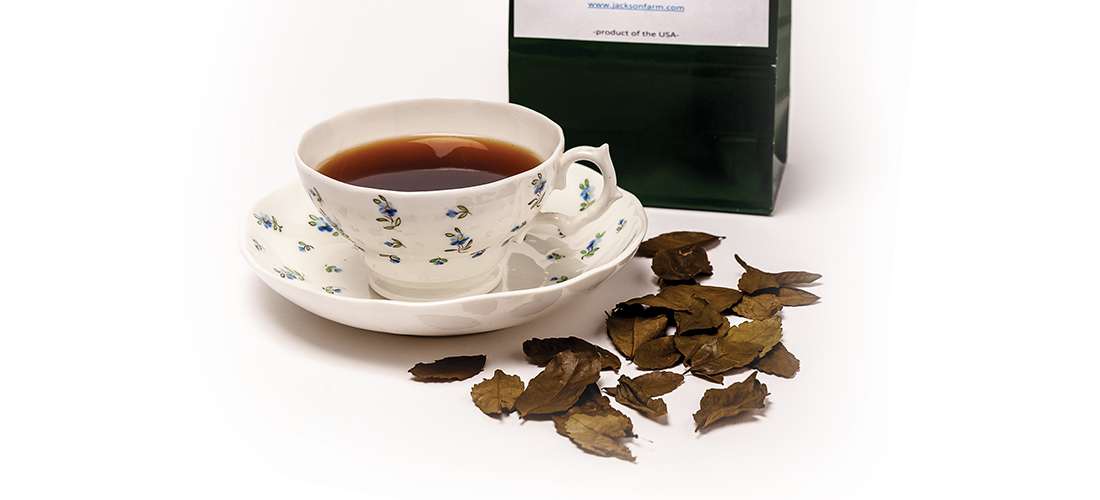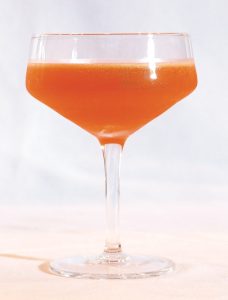
Black Drink
Carolina Tea — the only caffeine native to the U.S.
By Jan Leitschuh
What better way to take the winter chill off than a nice cup of tea, and a dollop of history? Say, an energizing “black drink” from the Outer Banks — sourced from a common shrub you might even have in your own backyard.
Mmmmm, pour us a drink, Luv.
And if you knew that this shrub’s Latin name was Ilex vomitoria — yes, you read that right, vomitoria — and that a tea from its leaves was used as a purge and emetic by Native American tribes . . . well, would you still be savoring that cuppa?
No worries, duckie. It’s simply bad press for an otherwise lovely dish of tea.
The yaupon holly, or Ilex vomitoria, is common throughout the Carolinas and has a solid and ancient history as a tea source fully grounded in the New World. A wild, perennial evergreen shrub, yaupon holly (pronounced YO-pon) is the only plant native to North America known to contain caffeine. The dried and roasted leaves of the yaupon are the source of North America’s only homegrown caffeinated beverage — yaupon tea. Historians tell us that yaupon leaves were used for centuries as a ceremonial tea by many native North American tribes.
Later, European settlers tumbled to the benefits of the energizing beverage they called “black drink.” Yaupon tea was quite well known and widely enjoyed during the Colonial period. Take that, British East India Company and your Asian tea; into Boston Harbor with ye!
The tough little yaupon holly ranges across the Southeastern United States, from Virginia to Florida and west to Texas, but is numerous in the Carolinas.
The Native Americans used it in purification rituals involving purging (thus, its Latin vomitoria). Lovely, right? But the Latin name is actually a misnomer, because yaupon is not an emetic, just guilty by ceremonial association. According to Charles Hudson, in his introduction to the book Black Drink: A Native American Tea, the scientific name derives from yaupon’s association with those purification ceremonies that entailed ritualistic vomiting, usually after adding seawater or other nausea-producing substances to the drink. But the tea of yaupon itself, as typically consumed, does not cause vomiting.
“Yaupon tea’s market was done great damage in the late 1700s by William Aiton, a Scottish botanist I believe was secretly in the employ of Ceylon tea merchants,” says Florida writer Francis E. “Jack” Putz. “In recognition of the use of an especially strong brew of yaupon in an Amerindian ritual that included ceremonial vomiting, Aiton named the plant Ilex vomitoria. Clearly this fascination says more about the early chroniclers of American life than about the qualities of the beverage.”
Wryly, Putz continues: “Researchers have revealed no emetic compounds in yaupon tea; it simply does not induce vomiting. That said, there were indeed special occasions when Timucuan and later Seminole warriors stood around vomiting after drinking large quantities of yaupon, but that was only after fasting for days and then singing, dancing, and generally carrying on all night; Kool-Aid would have had the same effect.”
Yaupon tea was actually a desirable prehistoric commodity, being exchanged at least as far west as Illinois. According to one source, over 1,000 years ago Native American traders dried, packed and shipped the leaves all the way to Cahokia, the ancient mound city near the confluence of the Missouri and Mississippi rivers by modern day St. Louis.
“It strengthens and nourishes the body, and yet does not fly to the head,” marveled French artist and North Florida explorer Jacques le Moyne de Morgues in 1564, after the native Timucua tribe offered the Frenchmen shells of the “black drink.” Thus was European teatime born in the New World. A Spanish priest in Florida reported in 1615, “There is no Spaniard or Indian who does not drink it in the morning or evening.” In 1791, famed Philadelphia botanist William Bartram noted in his writings that the Cherokee of Western North Carolina had obtained yaupon and it was under active pruning and cultivation. The Cherokee, he said, called yaupon “the beloved tree.”
Early settlers later enjoyed the black drink so much they traded it as a commodity to other countries. Not only was yaupon tea consumed regularly, especially throughout the Southeast, it was exported by ship to Europe, to be marketed as cassina in England and Appalachina in France. It was also traded from the Colonies under the moniker “Carolina Tea.” Apothecary shops dispensed it as a treatment for smallpox and kidney stones. English settlers of Carolina were said to drink the “Indian Tea” daily.
Later, during the Civil War, N.C. barrier islanders supplied the caffeinated leaves to cities blocked from importing tea and coffee. During the Great Depression and World War II, U.S. consumption once again spiked as tea and coffee became difficult to obtain. Folks needed their morning buzz! The drinking of yaupon tea persisted on the Outer Banks until the ’70s, and then lingered in island cafes. Ocracoke Island was the last known location to have served yaupon tea until recently.
While it once competed with Asian tea for a global market share, the antioxidant-rich yaupon tea dropped off the map for a while. The classic Chinese tea Camellia sinensis, was too entrenched, and some speculate that yaupon tea was later associated with the rural Southern poor at a time when coffee’s popularity was rising. Yet recent taste tests conducted at the University of Florida revealed an overwhelming preference for yaupon over its commercially available South American sister species, “yerba mate” — making it perfect for elevenses.
“Unfortunately,” writes Putz, “yaupon’s commercial potential was destroyed simply by the revelation of its scientific name.”
While many people today are still unaware of yaupon tea, it is experiencing a comeback, riding on the back of the farm-to-table movement for local foods, nostalgia and increased knowledge of its various medicinal benefits.
There is no need to import our teas from exotic continents, say fans of the yaupon.
“Our native yaupon is a delicious and healthy tea,” says Jan Mann Jackson of Jackson Farms. With her husband, Tom, the pair began cultivating the native tea on their 200-year-old traditional family farm on the other side of Fayetteville, in northern Sampson County. Although the Jacksons were among the first few farmers certified as “organic” many years ago, in recent years they discontinued the cost and paperwork of certification. “Although we have not changed our way of growing food,” says Jackson.
They acquired some yaupon holly from a yard in Morehead City to see if they could grow it on the farm for their use. “It grew well here,” says Jackson. They roasted the young leaves in the spring for themselves. Roasting makes the caffeine more soluble. Coffee beans are roasted for the same reason. The Jacksons found the tea quite delicious — no vomiting.
After perfecting their roasting methods, Jackson Farms began selling the tea leaves to restaurants and specialty shops about 10 years ago. Recently, they created a website — JacksonFarm.com — to sell their historic tea to the public.
Their beautifully packaged processed tea retails for $10 per ounce, “which will make a lot of tea,” says Jackson. “We also stock it with other teas in our farm’s guesthouse.”
A strong Carolina connection to yaupon tea exists, as the beverage was enjoyed here through Colonial times and persisted quite a while on the relatively isolated (and yaupon-filled) Outer Banks. “I first drank yaupon tea in a restaurant on Ocracoke Island in about 1957,” says Jackson. “Then I ran into a mention of it in John Lawson’s A New Voyage to Carolina. It interested me, and I eventually ran into the book Black Drink, by Charles M. Hudson, and learned a good deal more.”
Yaupon tea is an infusion tea made from steeping the dried and roasted yaupon leaves. Yaupon’s caffeine content is said to be more than black tea but less than coffee, and is closely related to yerba mate tea, which shares some of the same active ingredients and nutrients. Some say yaupon has a similar flavor profile to green tea; others say it tastes more like a black tea. The smell is earthy, and the health benefits numerous.
Yaupon is anti-inflammatory, helping reduce the pain of arthritis and other inflammatory conditions, improves dental health and digestive issues, and has shown promise as a preventive of colon cancer. Yaupon, a diuretic like coffee and tea, is rich in the desirable antioxidants known as polyphenols, comparable to other so-called “superfoods” like red wine, dark chocolate, broccoli, blueberries and green tea. These polyphenols stimulate the immune system. Theobromine, also found in yaupon, has been shown to lower blood pressure.
Aficionados say yaupon yields a jitter-free, energizing brew. Caffeine levels in yaupon vary, but are roughly comparable to green or black tea, so excess consumption would certainly lead to the jitters, just as it would with coffee. Depending on the strength brewed, the flavor can be anything from light, caramelly and buttery to intensely rich, complex, nutty and smoky, say fans. Yaupon is virtually free of tannins, so you can steep longer to bring out more flavor without risking the bitterness of regular tea. Perhaps the long steeping explains the name “black drink,” because a shorter steep yields a grassy, lighter tea.
In strong brews the slight bitterness of theobromine, coveted by lovers of dark chocolate, can be tasted. Theobromine (from Greek “food of the gods”) is the pleasure molecule of chocolate — the buzzy one that increases feelings of well-being, contentment and focus (and is also toxic to dogs).
The “black drink” can be enjoyed hot or iced, whatever your pleasure. By all means, support our local farmers and give this native tea a try, or ask for it at your local farm-to-table restaurant. And if you like it, you can try to make some at home, and beat January back with a steaming North American cuppa and a buttered scone. No need to raise your pinkie whilst sipping either, ducks.
“Backyard” Yaupon Tea
Know your plants, first of all. Be sure you know your yaupon. Collect fresh leaves, the newer growth if possible. Some say the females (the ones that produce the berries) make the best tea, but science has been unable to determine any chemical difference. Heat them (roast) in the oven at 300 degrees until they start to brown, about 7 or 8 minutes. Others simply blanch the leaves black in a skillet. Remove and add a tablespoon of crumbled leaves to your pot, and pour over two or three cups of hot (just-boiled) water. Steep for a few minutes, depending on strength preferred. Sweeten to taste. PS
Jan Leitschuh is a local gardener, avid eater of fresh produce and co-founder of the Sandhills Farm to Table Cooperative.





